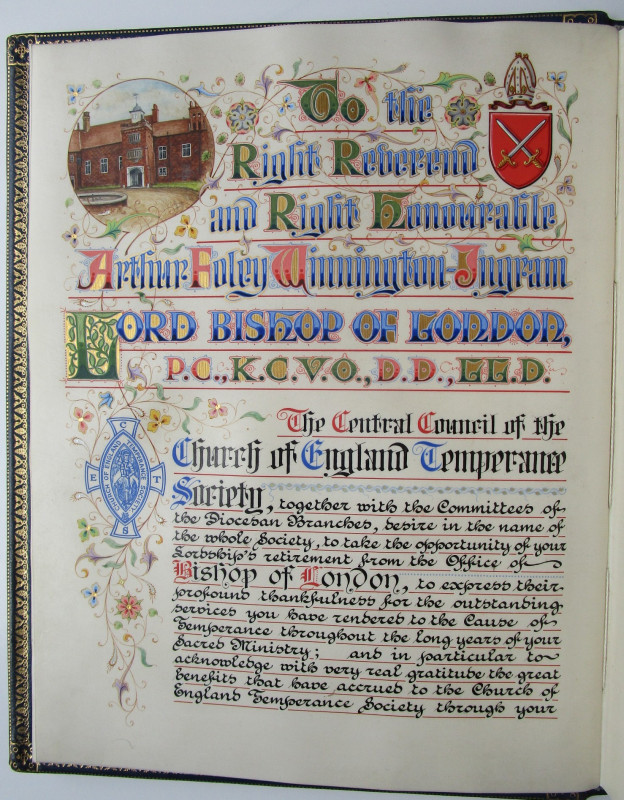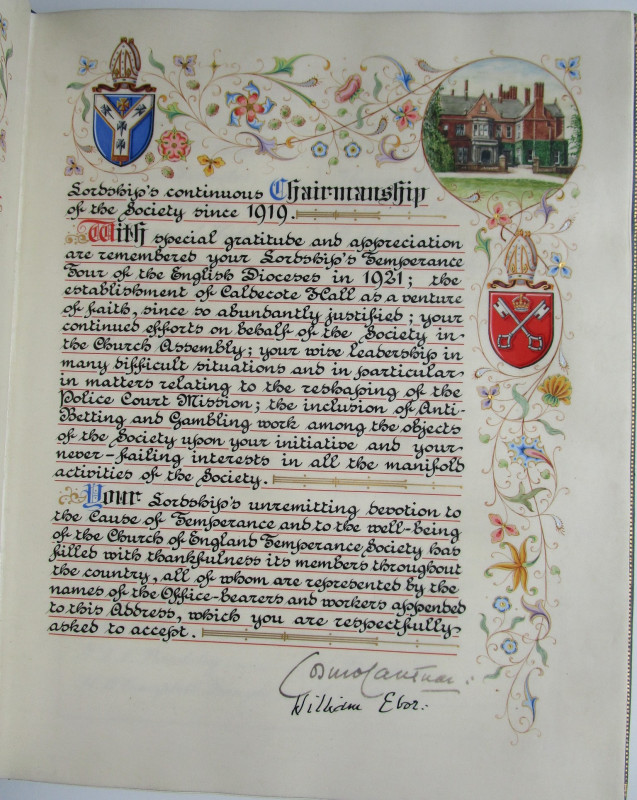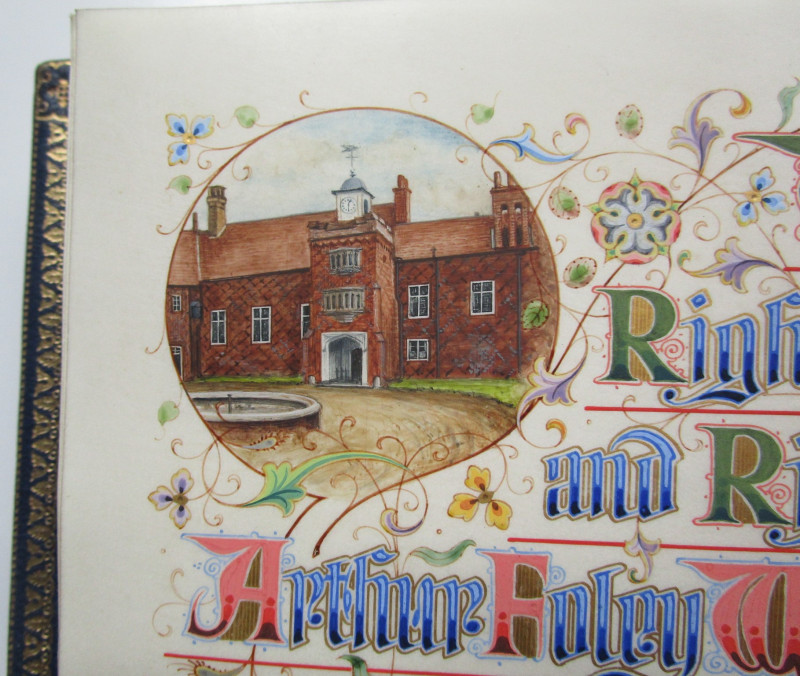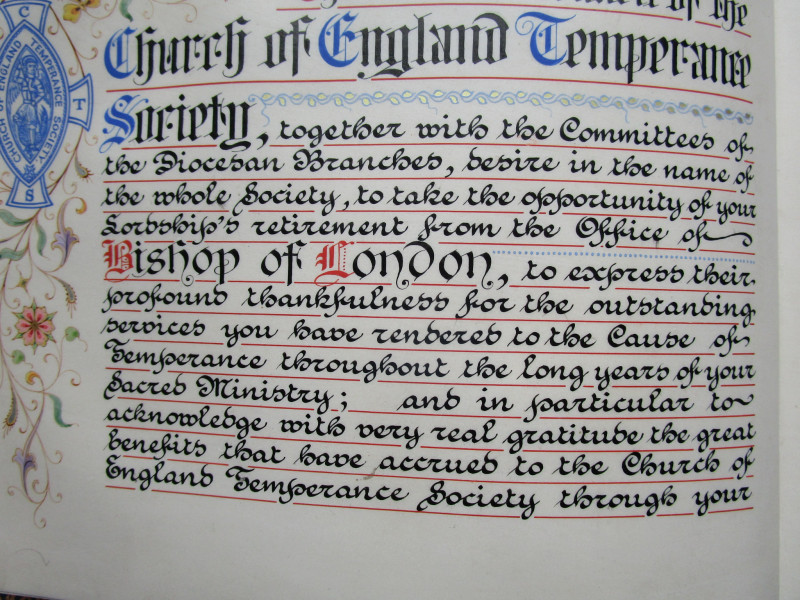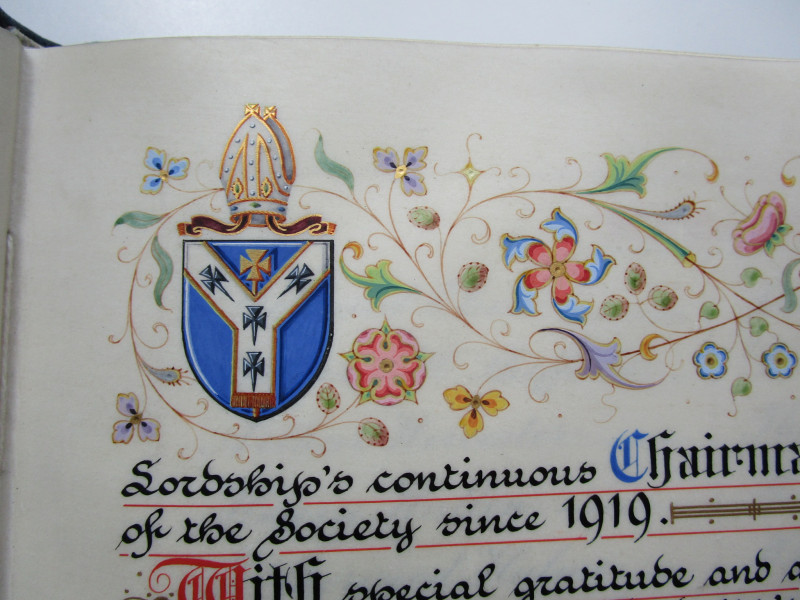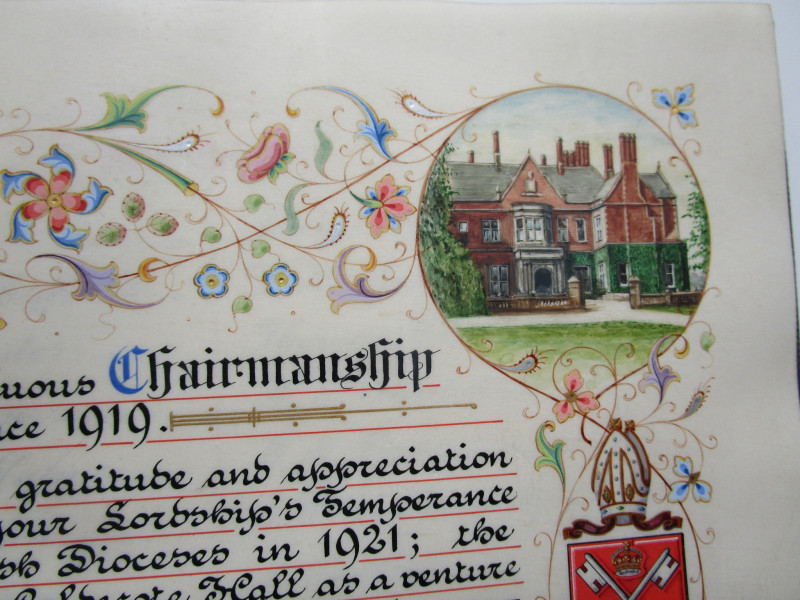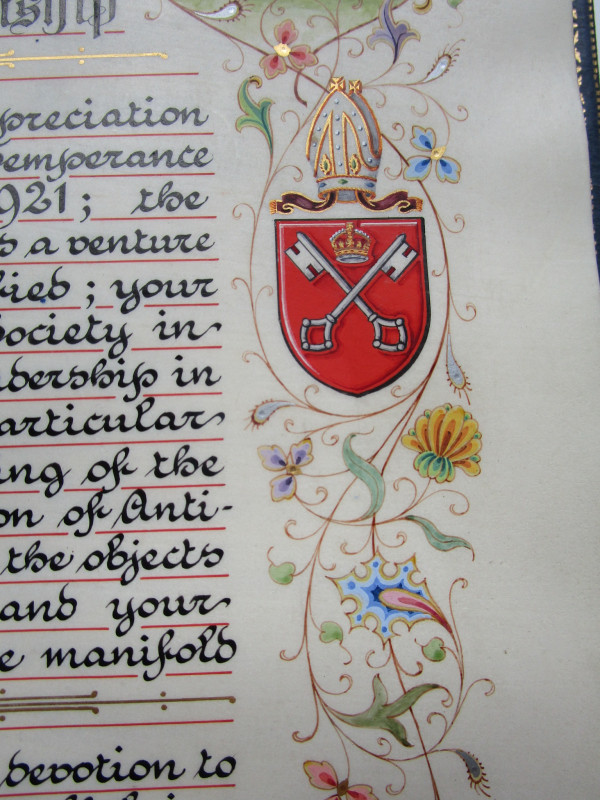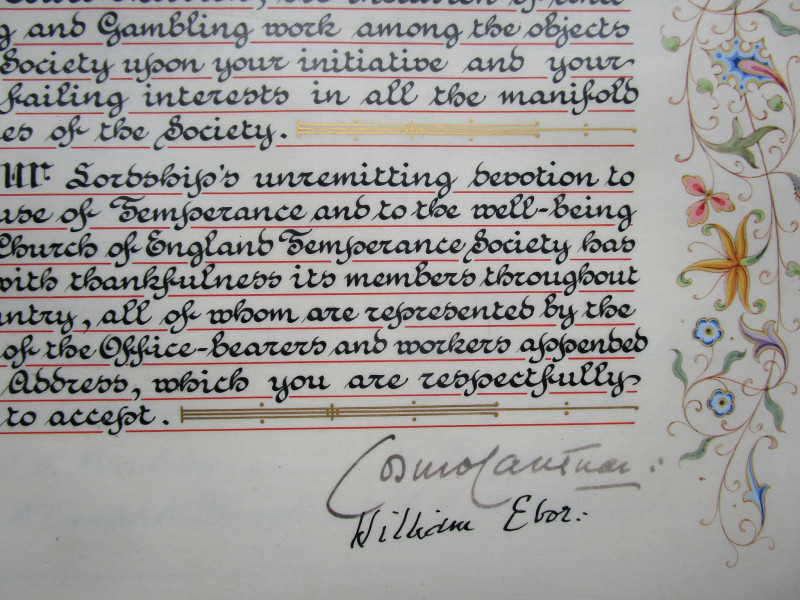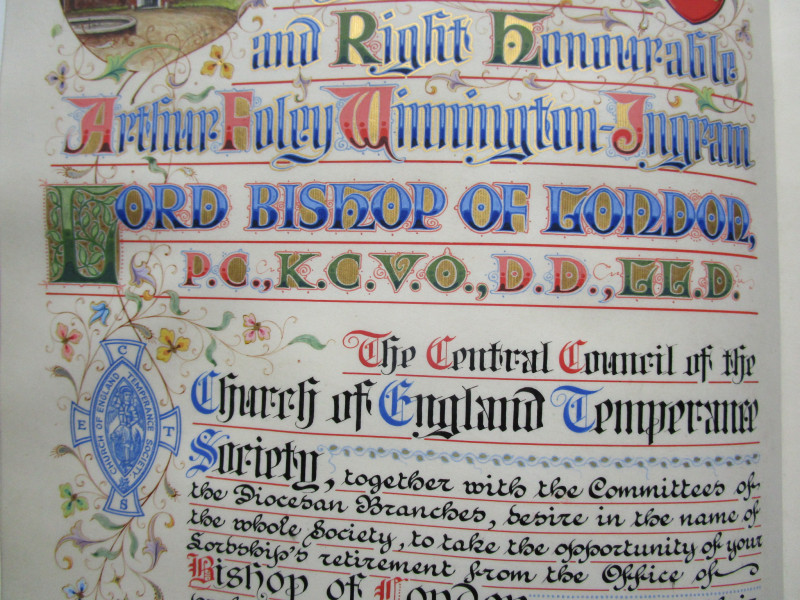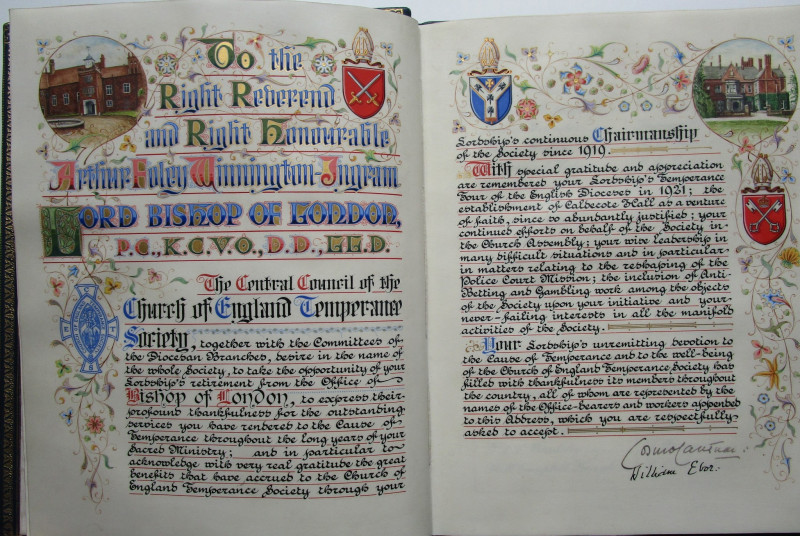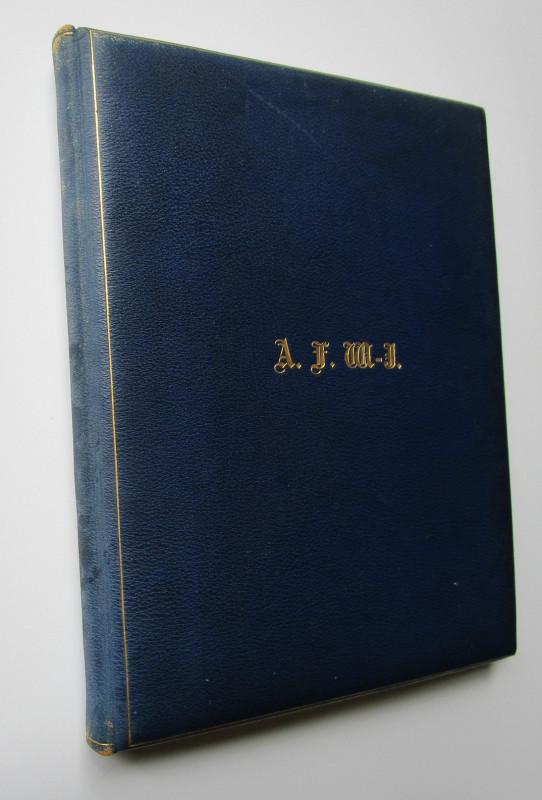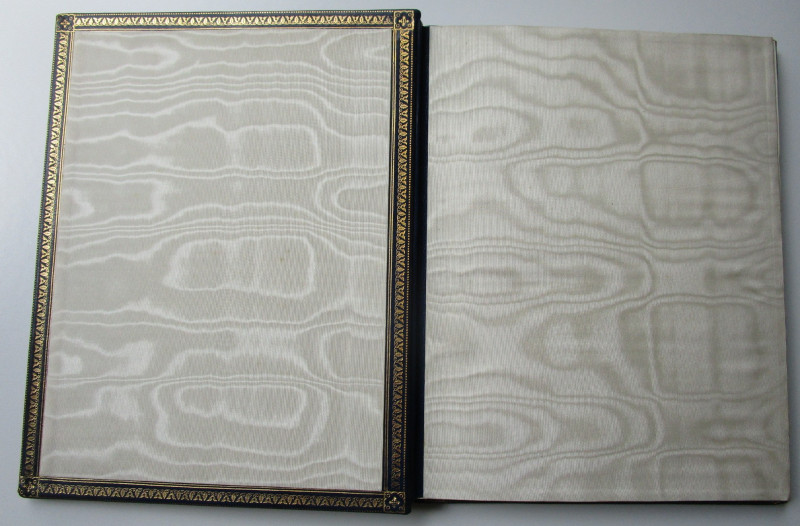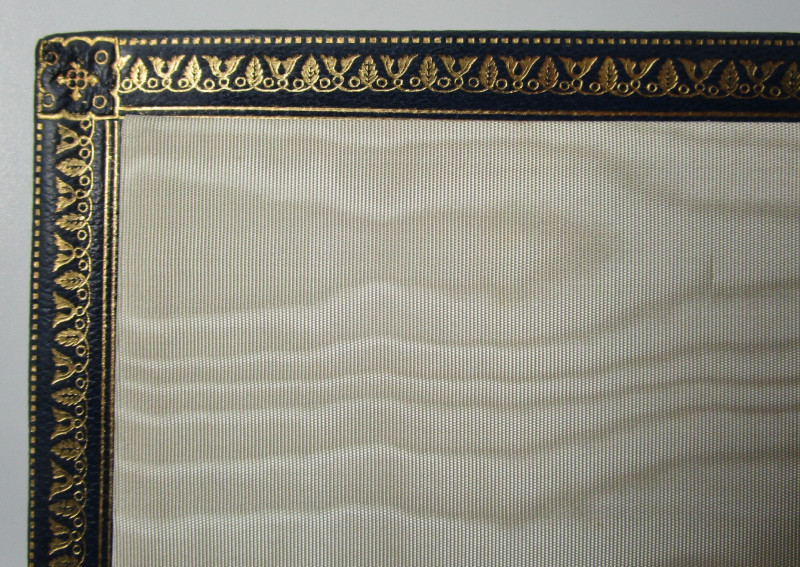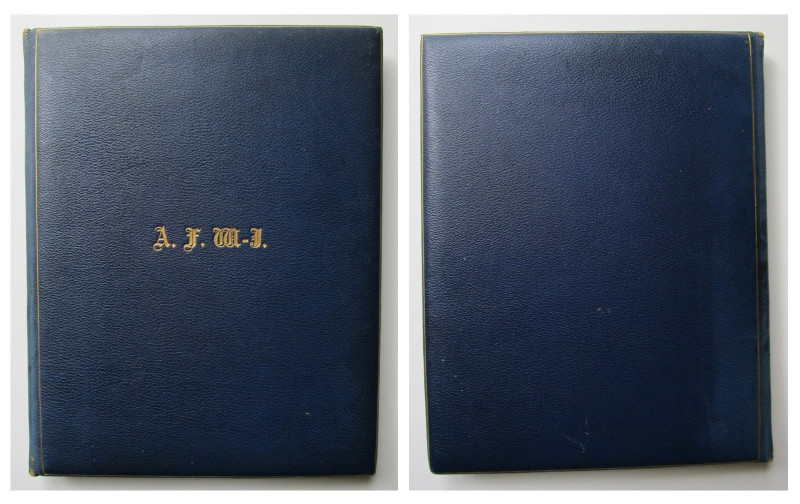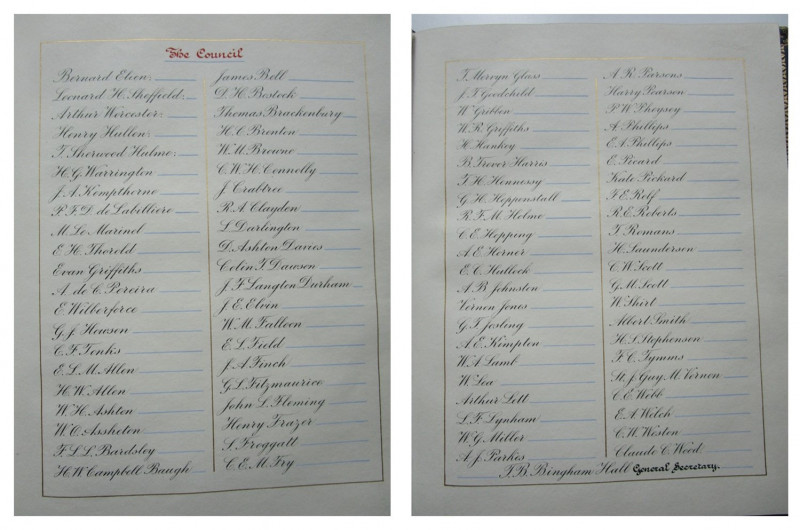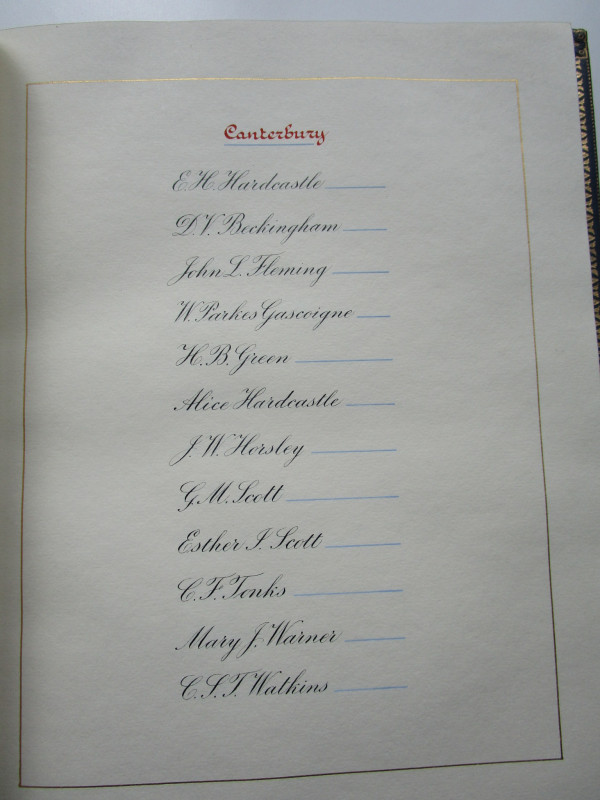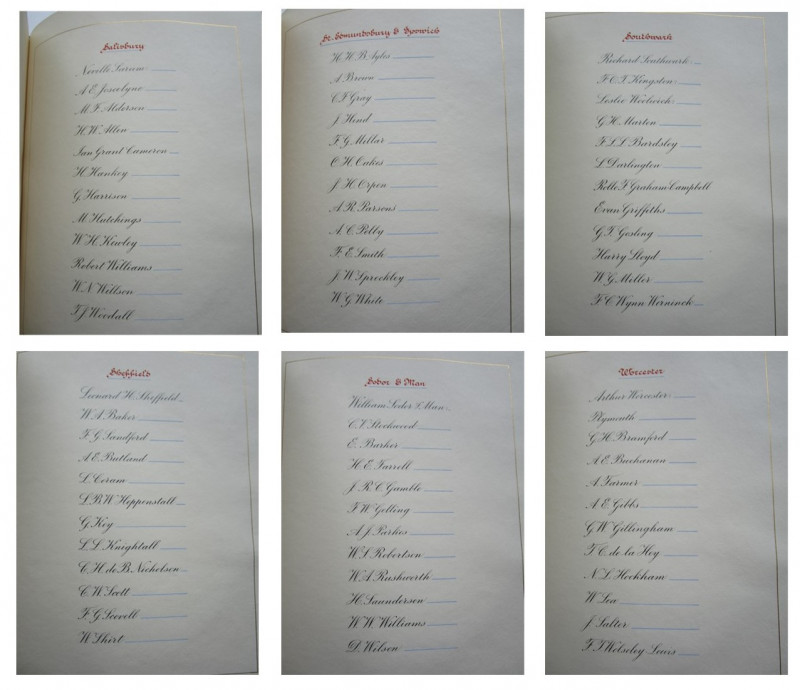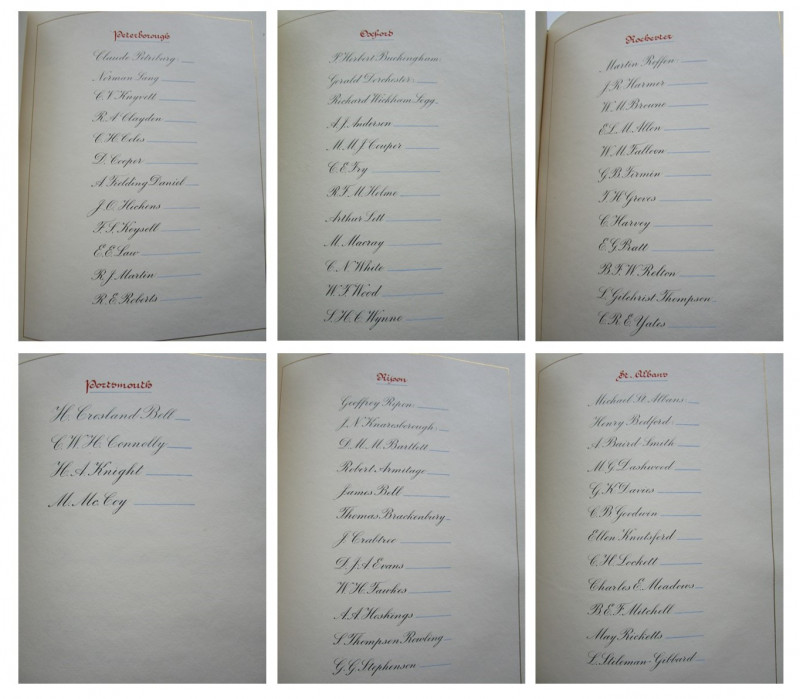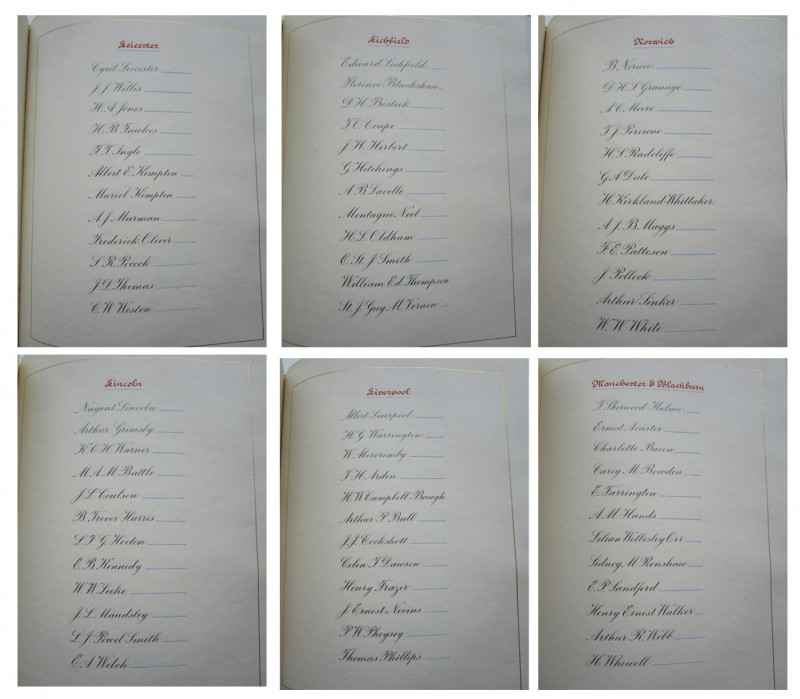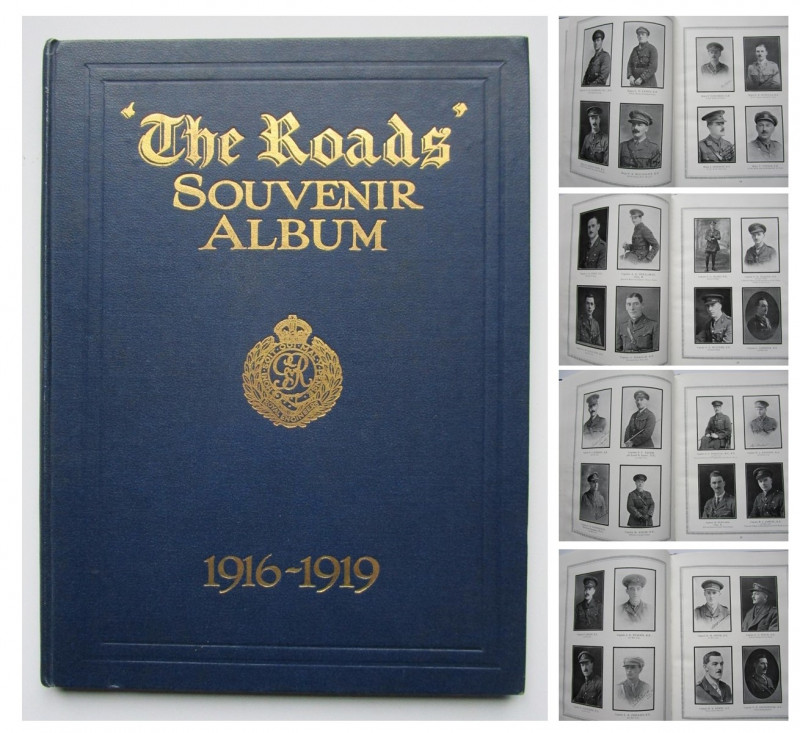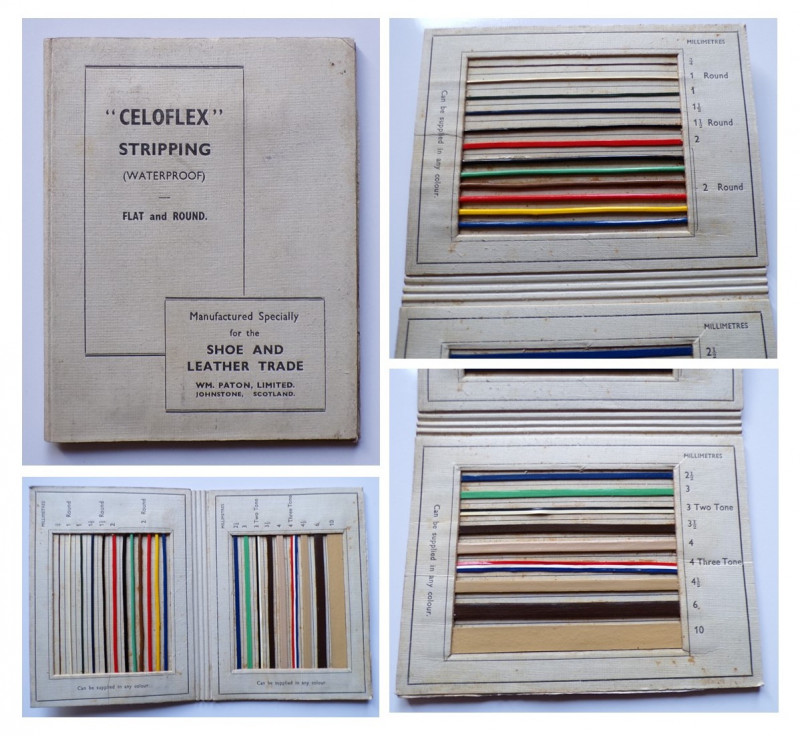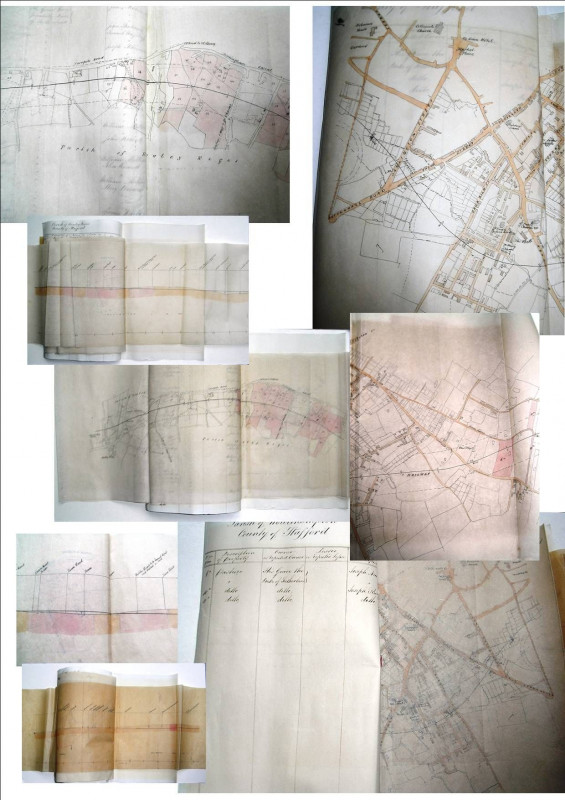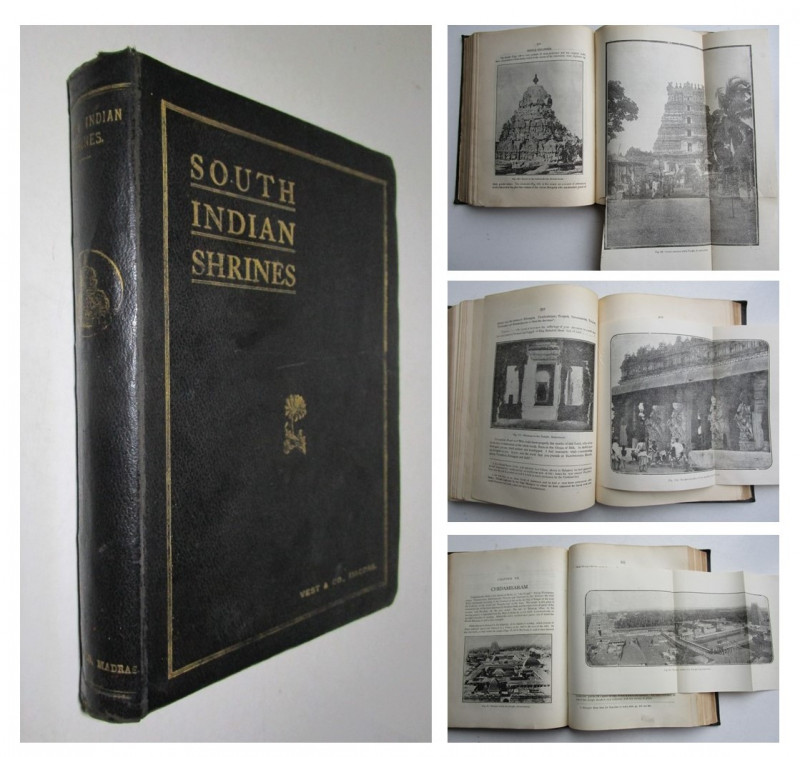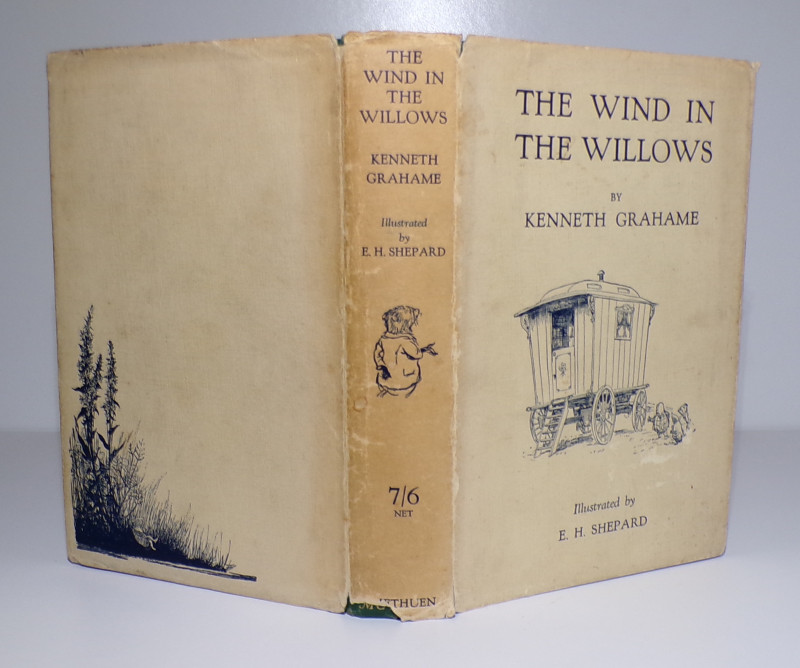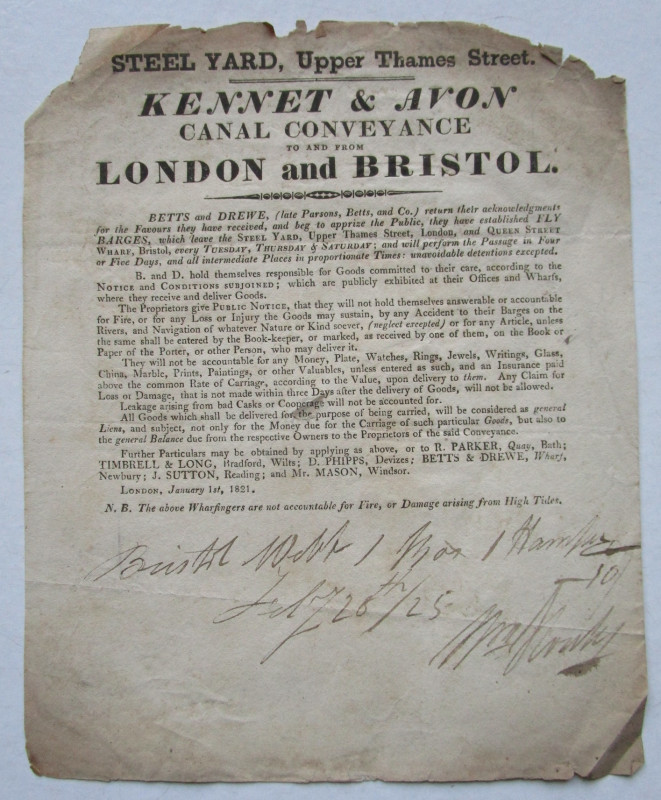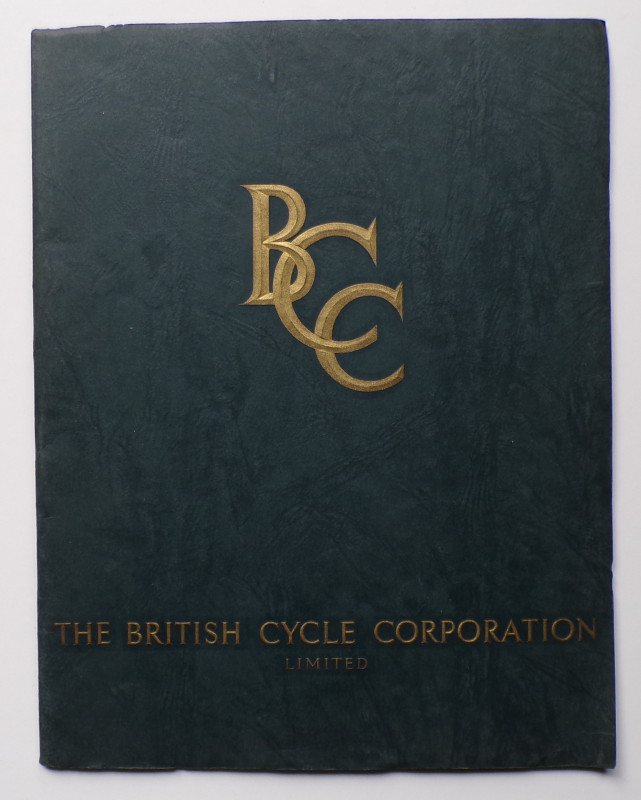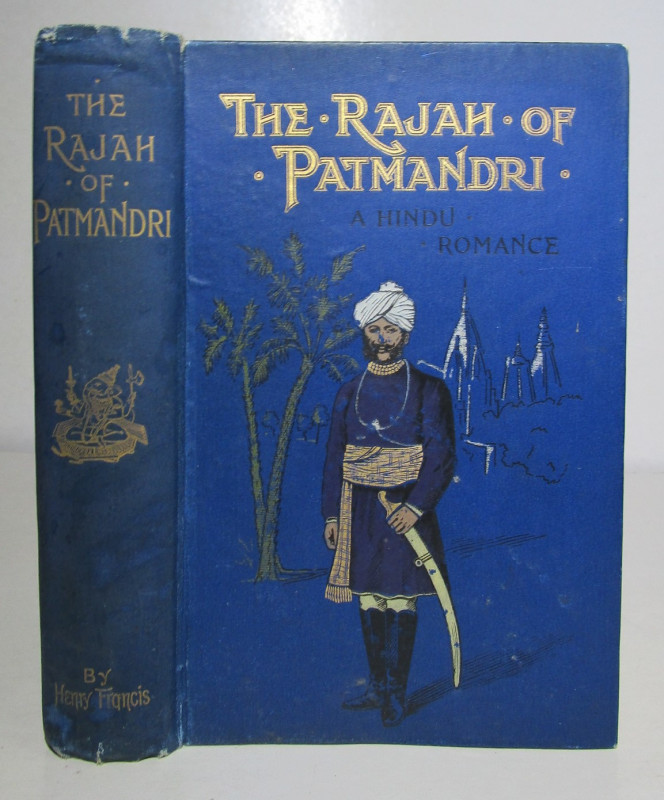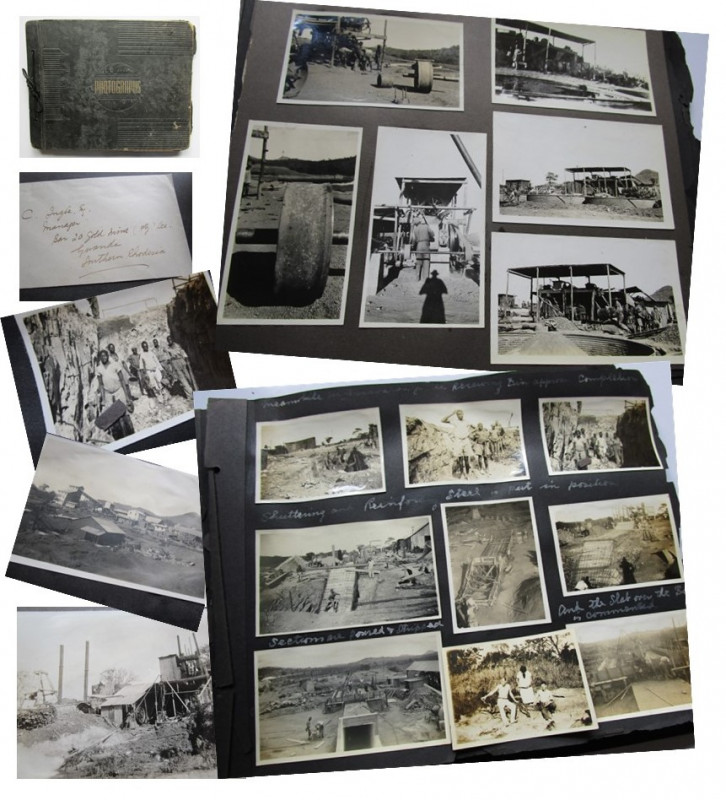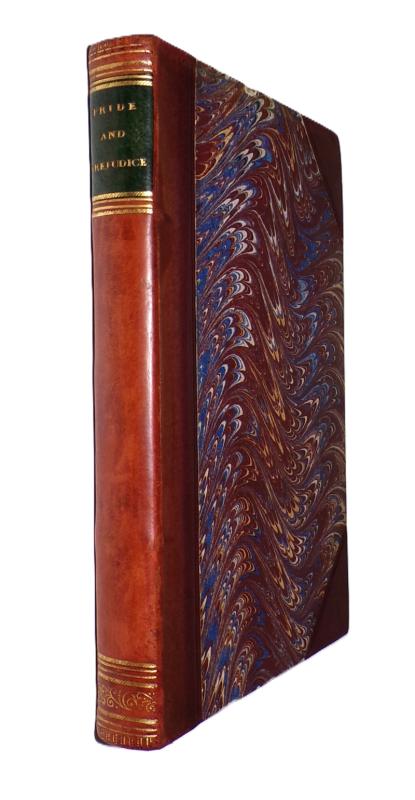STUNNING ILLUMINATED MANUSCRIPT
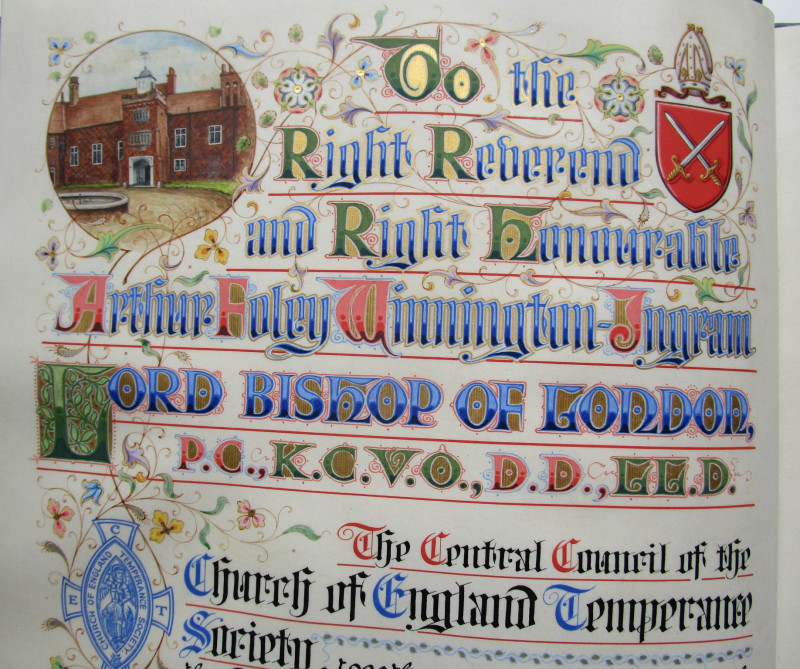
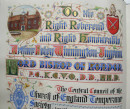
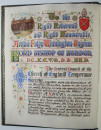
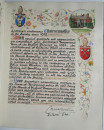
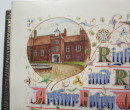













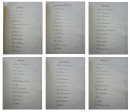
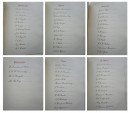
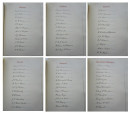
Book Description
This is a beautifully produced manuscript book presented to The Bishop of London, Arthur Foley Winnington-Ingram on his retirement, given by The Central Council of the Church of England Temperance Society.
The book is bound in a full leather binding with inner gilt dentelles and fitted with silk endpapers, the opening two pages are beautifully illuminated on vellum illustrated with two finely done small paintings, exquisite floral border decoration in many colours, highlighted in silver and gold, coats of arms and bishops mitres, within the decoration, this is then followed with thirty three pages of names of the council of the temperance society, and then names of members of different regional dioceses. These include Canterbury, London, Bath & Wells, Birmingham, Bradford, Bristol, Chelmsford, Chichester, Coventry, Exeter, Hereford, Leicester, Lichfield, Lincoln, Liverpool, Manchester & Blackburn, Norwich, Oxford, Peterborough, Portsmouth, Ripon, Rochester, St. Albans, St. Edmundsbury & Ipswich, Salisbury, Sheffield, Sodor & Man, Southwark, Worcester,
All these pages are beautifully handwritten in flawless calligraphy,
The book measures 12 inches by 9.5 inches approx.
Loosely inserted are some newspaper and magazine clippings and a letter from The Very Rev. J. A. H. Waddington, from the provost’s House at Bury St. Edmunds,
Apart from some rubbing to spine ends and corners, some mild discolouration to spine, the book is in excellent condition.
Dealer Notes
Arthur Foley Winnington-Ingram KCVO PC (26 January 1858 – 26 May 1946)
was Bishop of London from 1901 to 1939.
He was born in the rectory at Stanford-on-Teme, Worcestershire, the fourth son of Edward Winnington-Ingram (a Church of England priest and Rector of Stanford) and of Louisa (daughter of Henry Pepys, Bishop of Worcester).
Winnington-Ingram was educated at Marlborough College and Keble College, Oxford; he graduated with second-class honours in Literae Humaniores ('Greats') in 1881.
He was a private tutor in Europe, 1881–84; curate at St Mary's, Shrewsbury, 1884–85; private chaplain to the Bishop of Lichfield, 1885–89; head of Oxford House Settlement, Bethnal Green 1889–97, chaplain to the Archbishop of York, 1889; rector of St Matthew's, Bethnal Green, 1895; rural dean of Spitalfields, 1896; and canon of St Paul's Cathedral, 1897. Episcopal career In 1897, Winnington-Ingram was raised to the episcopate as the second suffragan Bishop of Stepney.
In 1901, after the death of Mandell Creighton, he was nominated to the See of London, and he was in the same year appointed as a Privy Counsellor. As a preacher he proved very successful. He was a leader in social work in London's East End.
During the First World War Winnington-Ingram threw himself into supporting the war effort. He saw the war as a "great crusade to defend the weak against the strong" and accepted uncritically stories of German atrocities. For a clergyman the language he used about the German people verged on xenophobia and H. H. Asquith, Prime Minister at the outbreak of the war, described his pitch as "jingoism of the shallowest kind". He spoke in aid of recruiting drives and later in the war urged his younger clergy to consider enlisting as combatants. Chaplain from 1901 to the London Rifle Brigade and London Royal Naval Volunteers, he visited the troops on both the Western Front and at Salonika, and the Grand Fleet at Rosyth and Scapa Flow. A despatch from Field Marshal French portrayed Winnington-Ingram's visit to the Western Front; "The Bishop held several services virtually under shell fire, and it was with difficulty that he could be prevented from carrying on his ministrations under rifle fire in the trenches." Such apparent derring-do and appeals to patriotism strengthened his reputation as a 'people's bishop'.
Winnington-Ingram was renowned as a charismatic preacher and persuasive writer, and he was arguably better known and more influential than either of the archbishops. Examples of his persuasive vocabulary can be traced throughout the War in the monthly London Diocesan Magazine, often quoted in the press: "Now, Jerusalem is a beautiful place, but England is far more beautiful", "We face possibly another year of war, but it is God’s War; it is War for peace; it is a War for all the things which are essential to lasting peace, freedom, respect for national aspirations, international honour and chivalry to the weak", "Great Britain has risen like a tower out of the deep and stands today higher in the opinion of the world than it has since Trafalgar and Waterloo". For his war work he was Mentioned in Despatches and awarded the Grand Cross of the Order of the Redeemer (Greece) and the Order of St Sava, 1st Class (Serbia).
On 22 May 1946, Winnington-Ingram was taken ill while playing golf and he died a few days later on 26 May 1946 in Upton-upon-Severn, Worcestershire. His remains were buried at St Paul's Cathedral. He never married, although while Bishop of Stepney he was briefly engaged to Lady Ulrica Duncombe, a friend of Queen Alexandra and daughter of William Ernest Duncombe, 1st Earl of Feversham of Ryedale and Mabel Violet Graham. Australian sculptor Theodora Cowan created a portrait bust of Dr Winnington-Ingram which "took pride of place" in her one-woman show at London's Grafton Galleries. He is commemorated in some of the street names in Hampstead Garden Suburb: The Bishops Avenue, Winnington Road and Ingram Avenue; and Bishop Winnington-Ingram Primary School, Ruislip. A wide public was familiar with Winnington-Ingram through numerous illustrations of various kinds, including cartoons; the National Portrait Gallery catalogues a collection of fifty-three portraits. There is a portrait in Keble College Hall.
was Bishop of London from 1901 to 1939.
He was born in the rectory at Stanford-on-Teme, Worcestershire, the fourth son of Edward Winnington-Ingram (a Church of England priest and Rector of Stanford) and of Louisa (daughter of Henry Pepys, Bishop of Worcester).
Winnington-Ingram was educated at Marlborough College and Keble College, Oxford; he graduated with second-class honours in Literae Humaniores ('Greats') in 1881.
He was a private tutor in Europe, 1881–84; curate at St Mary's, Shrewsbury, 1884–85; private chaplain to the Bishop of Lichfield, 1885–89; head of Oxford House Settlement, Bethnal Green 1889–97, chaplain to the Archbishop of York, 1889; rector of St Matthew's, Bethnal Green, 1895; rural dean of Spitalfields, 1896; and canon of St Paul's Cathedral, 1897. Episcopal career In 1897, Winnington-Ingram was raised to the episcopate as the second suffragan Bishop of Stepney.
In 1901, after the death of Mandell Creighton, he was nominated to the See of London, and he was in the same year appointed as a Privy Counsellor. As a preacher he proved very successful. He was a leader in social work in London's East End.
During the First World War Winnington-Ingram threw himself into supporting the war effort. He saw the war as a "great crusade to defend the weak against the strong" and accepted uncritically stories of German atrocities. For a clergyman the language he used about the German people verged on xenophobia and H. H. Asquith, Prime Minister at the outbreak of the war, described his pitch as "jingoism of the shallowest kind". He spoke in aid of recruiting drives and later in the war urged his younger clergy to consider enlisting as combatants. Chaplain from 1901 to the London Rifle Brigade and London Royal Naval Volunteers, he visited the troops on both the Western Front and at Salonika, and the Grand Fleet at Rosyth and Scapa Flow. A despatch from Field Marshal French portrayed Winnington-Ingram's visit to the Western Front; "The Bishop held several services virtually under shell fire, and it was with difficulty that he could be prevented from carrying on his ministrations under rifle fire in the trenches." Such apparent derring-do and appeals to patriotism strengthened his reputation as a 'people's bishop'.
Winnington-Ingram was renowned as a charismatic preacher and persuasive writer, and he was arguably better known and more influential than either of the archbishops. Examples of his persuasive vocabulary can be traced throughout the War in the monthly London Diocesan Magazine, often quoted in the press: "Now, Jerusalem is a beautiful place, but England is far more beautiful", "We face possibly another year of war, but it is God’s War; it is War for peace; it is a War for all the things which are essential to lasting peace, freedom, respect for national aspirations, international honour and chivalry to the weak", "Great Britain has risen like a tower out of the deep and stands today higher in the opinion of the world than it has since Trafalgar and Waterloo". For his war work he was Mentioned in Despatches and awarded the Grand Cross of the Order of the Redeemer (Greece) and the Order of St Sava, 1st Class (Serbia).
On 22 May 1946, Winnington-Ingram was taken ill while playing golf and he died a few days later on 26 May 1946 in Upton-upon-Severn, Worcestershire. His remains were buried at St Paul's Cathedral. He never married, although while Bishop of Stepney he was briefly engaged to Lady Ulrica Duncombe, a friend of Queen Alexandra and daughter of William Ernest Duncombe, 1st Earl of Feversham of Ryedale and Mabel Violet Graham. Australian sculptor Theodora Cowan created a portrait bust of Dr Winnington-Ingram which "took pride of place" in her one-woman show at London's Grafton Galleries. He is commemorated in some of the street names in Hampstead Garden Suburb: The Bishops Avenue, Winnington Road and Ingram Avenue; and Bishop Winnington-Ingram Primary School, Ruislip. A wide public was familiar with Winnington-Ingram through numerous illustrations of various kinds, including cartoons; the National Portrait Gallery catalogues a collection of fifty-three portraits. There is a portrait in Keble College Hall.
Author
PRESENTED TO THE BISHOP OF LONDON
Date
1939
Binding
leather
Publisher
The Central Council of the Church of England Temperance Society
Condition
very good
Friends of the PBFA
For £10 get free entry to our fairs, updates from the PBFA and more.
Please email info@pbfa.org for more information
